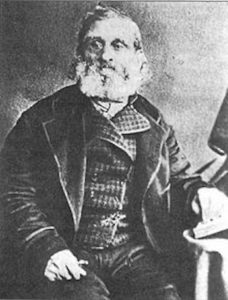
Wilson R. Abbott
*This date celebrates the birth of Wilson Ruffin Abbott, a Black Canadian businessman, who was born in 1801.
From Richmond, VA, he was the son of a Scotch-Irish father and a free Black mother. Abbott was apprenticed as a carpenter as a teenager but left home at 15 to work as a steward on a Mississippi River steamer. Seriously injured when cordwood fell on him, he was nursed by a Boston traveler’s maid, Ellen Toyer, whom he later married. They moved to Mobile, Alabama, where he opened a general grocery store. Abbott and his family were indignant in response to Jim Crow segregation when the city required all free Negroes to provide bonds signed by two white men in the pledge of their good behavior.
In 1834, receiving an anonymous warning that his store was to be pillaged, he withdrew his savings, put his wife and two children aboard a steamer for New Orleans, and slipped away alone on the night his store was attacked. After a brief sojourn in New York, the Abbotts moved to Toronto in late 1835, one of the hundreds of black American families, to seek greater freedom in Upper Canada. After trying the tobacco business, Abbott became a dealer in properties and increasingly made his mark in real estate. However, he could not read until his wife taught him; he was known for his unusual ability to do complex calculations in his head.
By 1871, Abbott owned 42 houses, five vacant lots, and a warehouse, largely in Toronto, Hamilton, and Owen Sound. He helped purchase freedom for fugitive slaves, kept his wife’s sister, Mary, as a housekeeper on wages, and aided another sister-in-law, Jane, who married A. H. Judah in Toronto. As the family fortunes grew, they became increasingly interested in public affairs. Abbott served in the militia during the rebellion of 1837. In 1838, he was one of six organizers of the Colored Wesleyan Methodist Church, aiding in purchasing property for it.
He supported the Anti-Slavery Society of Canada and was elected to the city council from St Patrick’s ward, which he carried by some 40 votes. He served as a member of the central committee established in 1859 by the Reformers in Canada West. In 1840, Mrs. Abbott helped organize the Queen Victoria Benevolent Society to aid indigent Black women, and in later years, she was active in the British Methodist Episcopal Church.
Abbott had four sons and five daughters. One son, Anderson Ruffin, would become the first Canadian-born Negro to receive a license to practice medicine. Toronto and Ontario had once had a substantial Negro population, but this had fallen off after the American Civil War until there were perhaps not more than 2,000 Negroes in Toronto, where once there had been three times as many. By the latter part of the century, prejudice had expressed itself against black men in various ways in the province, and most blacks went to segregated schools and separate churches. In Toronto, however, anti-Black prejudice spread less deeply: Knox Presbyterian Church would place a visiting Negro in the pulpit, on occasion, other black men would achieve at least modest successes in business, and Toronto’s schools were never segregated.
Abbott did not encounter serious discrimination, even though Negroes elsewhere in the province did; thus, his experience was not typical. His undoubted business and wealth abilities no doubt helped offset most of the residual prejudice he may otherwise have met. Wilson Abbott died in Toronto, Ont., in 1876.
Hubbard-Abbott collection. Evening Telegram (Toronto), 17 May 1911. Globe (Toronto), 11 Dec. 1847. R. W. Winks, The blacks in Canada; a history (Montreal, 1971).
D. G. Hill, “Negroes in Toronto; a sociological study of a minority group,” unpublished Ph.D. thesis, University of Toronto, 1960; “Negroes in Toronto, 1793–1865,” Ont. Hist., LV (1963), 73–92.